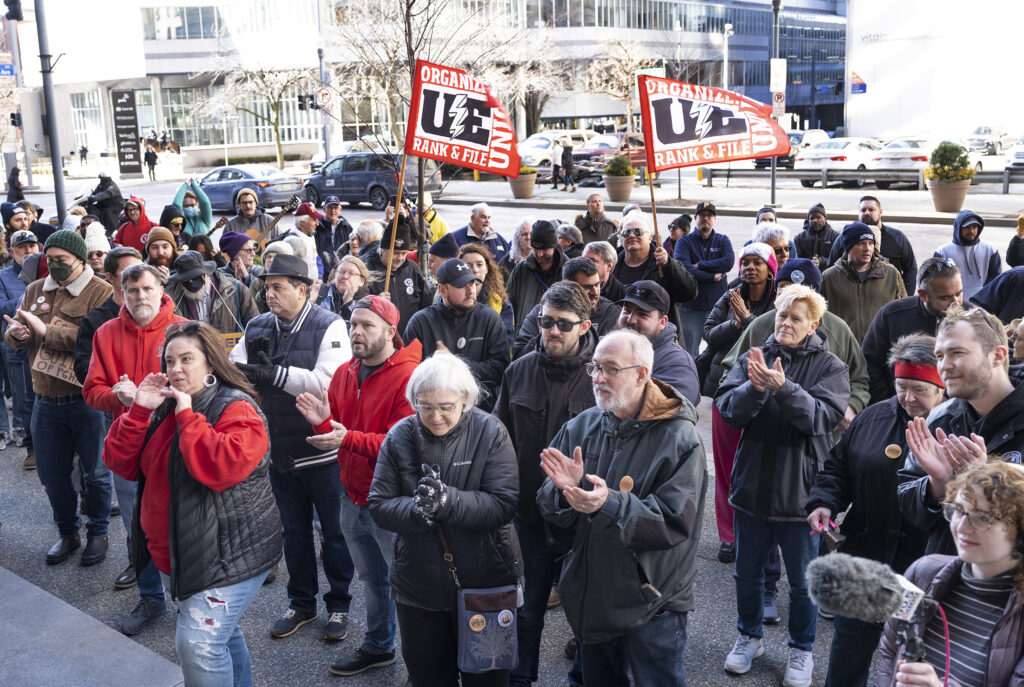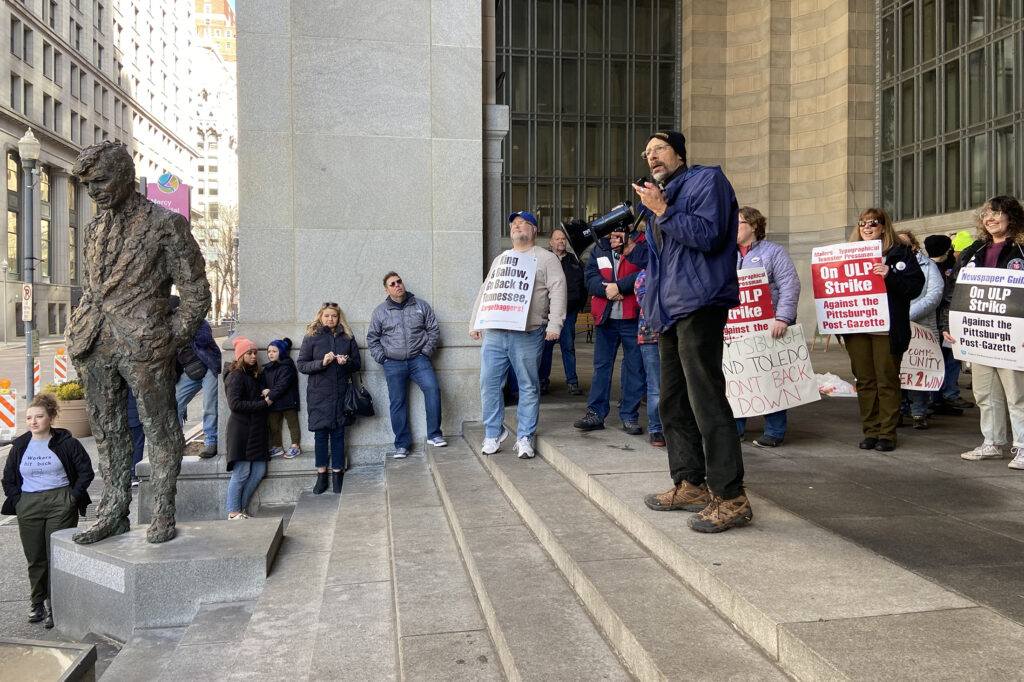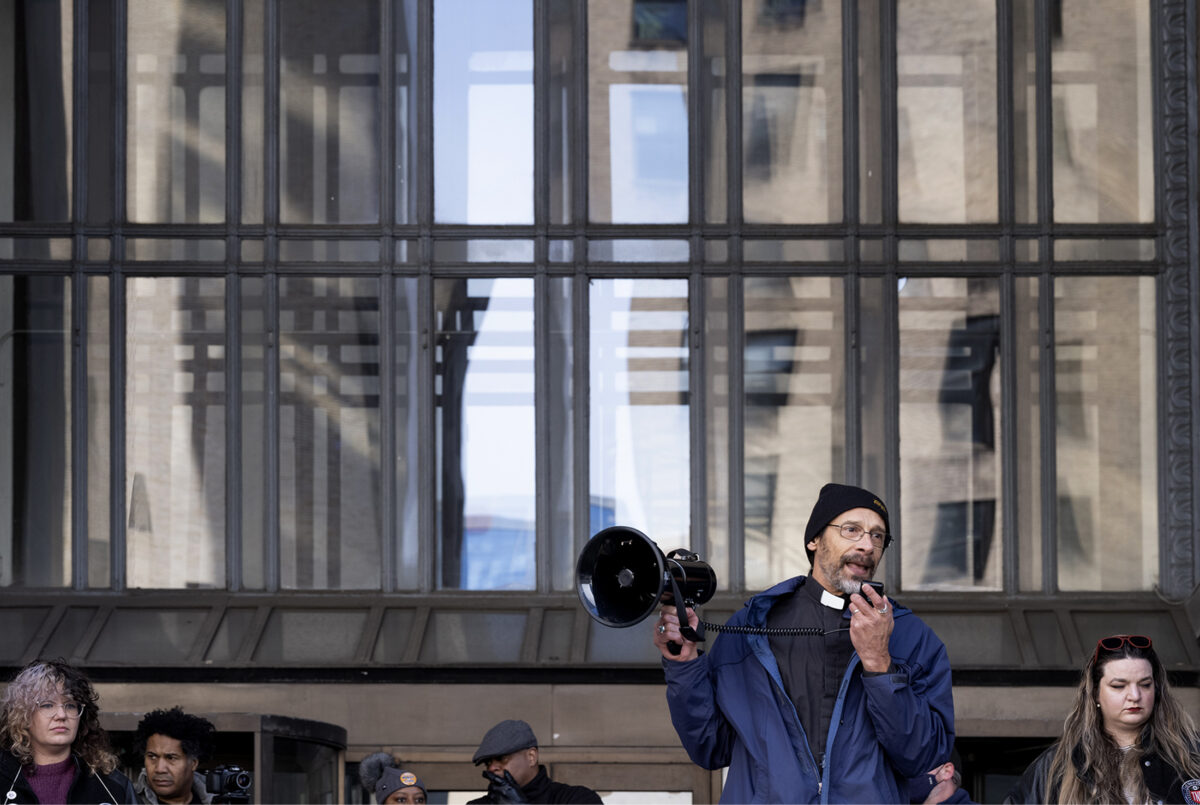Two days after soaking up the support of more than 100 union members and sympathetic politicians, after the chorus of voices singing “Solidarity Together” had long since ceased its echo down Grant Street, workers who walked out of the Post-Gazette newsroom and production facilities in October awakened Monday to the reality that has governed their daily lives for more than three months: They are still on strike. Before them looms yet another week without a paycheck. Another week without the work and structure that helped give meaning and purpose to their lives.
The Rev. Vincent Kolb knew the strikers would experience this moment. Wearing a pastor’s collar, he mixed with the crowd gathered near the steps of Downtown’s City-County Building shortly after noon Saturday for a rally marking the 100th day of the Newspaper Guild of Pittsburgh’s strike. He listened as a diverse group of a half-dozen speakers — rank-and-file union members, organizers and political leaders — delivered messages that buoyed the strikers’ spirits.
Shortly before 1 p.m. Kolb was called forward to accept the megaphone as the event’s final speaker. He introduced himself as the pastor of Sixth Presbyterian Church in Squirrel Hill — people often call it “Mr. Rogers’ church” because Fred Rogers was a lifetime member — and then talked briefly about his own experience with work stoppages decades ago.
After graduating from high school in 1977, Kolb worked his way through California State University, Fullerton, by working the “graveyard shift” at a grocery store. It was a union job — he was represented by the United Food Workers — and he was engaged twice in strikes.
Both were brief. Still, “it was agonizing,” he said. “So I can’t even begin to imagine what it has been like for you to be out for 100 days.”
Thus began a frank description of the crisis faced by workers who challenge an employer by embarking on a lengthy work stoppage. The strikers and supporters who had moments before filled Grant Street with their cheers grew quiet.
“I know it probably began with a great deal of exhilaration as you were making a principled stand, and you were doing it together,” Kolb said. “And you had such high hopes that things were going to work out with the right kind of resolution so that you would be paid what you deserve for your work.
“Then the hours gave way to weeks, and the weeks have now given way to months. And there have been sleepless nights, as you’ve thought about your resources slowly dwindling, and you’ve wondered how you’re going to pay your bills and how you’re going to pick up your prescriptions.”

Accompanying these difficulties, he noted, are anxieties over promising careers that now seem stalled, questions about what to do next as the strike drags on. He described this as “an even deeper, more difficult thing to face” than financial concerns, especially for journalists drawn to the profession because of its essential role in American society.
(“I don’t assume anyone goes into journalism unless they see it as a calling,” Kolb would say in a later conversation.)
Kolb speculated on the questions tumbling through strikers’ minds: “Have I labored in vain? Should I just cut bait and run? Should we just settle? Should I find just another line of work because my dreams have been dashed?”
The consolidation of news organizations and slashing of newsroom jobs is a concern for everyone, not just the reporters, photographers and editors who face wage and benefit cuts, increasing workloads and layoffs, Kolb said a few hours after his speech. If local journalists disappear, who will keep an eye on elected officials at the borough, city and state level? Who will watch and question decisions made in school board meetings?
“These are not glamorous places, but that’s where decisions are made that affect all of us,” Kolb said. “If the media is not there, it’s open season. The implications for all of us, if there’s no free press, are too staggering to think about.”
Striking PG workers are playing a leading role in the fight for decent wages, benefits and working conditions that will allow the profession to attract and retain employees dedicated to the idea of a free and independent press.
“Your strike has emboldened others,” he said.
In his speech, Kolb highlighted an idea first voiced by a writer with whom he admits he often disagrees — conservative columnist David Brooks of The New York Times. Brooks wrote in 2015 that he recognized two sets of virtues: resume virtues and eulogy virtues.
Resume virtues, Brooks wrote, are the skills one brings to the marketplace. Kolb elaborated, describing them as the work one engages in to provide the necessities of life for themselves and loved ones, and to develop a career.
Eulogy virtues “are the ones that are talked about at your funeral — whether you were kind, brave, honest or faithful,” Brooks wrote. Kolb added that these virtues “are about what kind of human beings we are for one another.”
Kolb told the striking workers, “‘You’re going to get a chance to build your resume again, but your eulogies look good right now.”
In the late 1970s, Kolb earned $11 an hour at his union job in California. Working overnight at a grocery store and attending classes during the day proved difficult, he said, but union wages allowed him to pay for his college education in a state system that was then affordable.
Kolb married shortly after graduating high school, and the wages made it possible for him to achieve some of the benchmarks of middle-class family life.
“Because of the job’s insurance and benefits, our first child didn’t cost us a dime,” he said. “And I was able to buy a home as an 18-year-old with a union job.”
But that was nearly five decades ago, he noted. Things have changed.
“What has been done to the middle class and to the dignity of working people because of greed and the attitude of ‘Let’s just bleed everyone dry and claim they’re lazy’ — it’s just so wrong,” he said. “It’s immoral.”
Kolb ended his speech by urging those in the crowd to find ways to live and stand together because “we are tied together in that invisible web of destiny. What happens to others is going to happen to us.
“I get up every morning, and I remind myself, ‘Vincent, you are warmed by fires you did not build, you are refreshed by wells you did not dig and you are shaded by trees that you did not plant. So I want to thank all of you newspaper workers who have been out on strike for 100 days, because you have been a strong link in the chain for the rest of us.”

Steve is a photojournalist and writer for the Pittsburgh Post-Gazette, but he is currently on strike and working as a Union Progress co-editor. Reach him at smellon@unionprogress.com.



